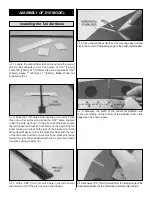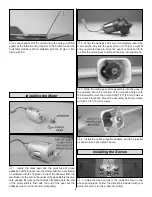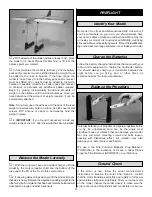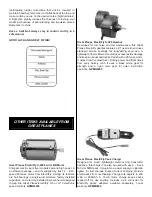
❏
1. The areas where you will be mounting your receiver,
speed control, and battery must have a thin coating of glue
to allow the Velcro to attach. You can use CA or any type of
wood glue for this purpose. Allow the glue to dry or cure
completely before attaching the Velcro. Note the location of
the mounted speed control in the above photograph.
❏
2. The photograph illustrates the placement of the
receiver. Place a 1/16" [1.6mm] hole close to the receiver in
the bottom of the fuselage. Feed the antenna through this
hole and tape it into place on the wing.
❏
3. Note the installation and position of the battery pack.
❏
4. Install the hatch.
1. Use scissors or a sharp hobby knife to cut the decals from
the sheet.
2. Be certain the model is clean and free from oily
fingerprints and dust. Prepare a dishpan or small bucket
with a mixture of liquid dish soap and warm water–about
one teaspoon of soap per gallon of water. Submerse the
decal in the soap and water and peel off the paper backing
while the decal is in the soapy water. Note: Even though the
decals have a “sticky-back” and are not the water transfer
type, submersing them in soap & water allows accurate
positioning and reduces air bubbles underneath.
3. Position decal on the model where desired. Hold the
decal down and use a paper towel to wipe most of the
water away.
4. Use a piece of soft balsa or something similar to
squeegee remaining water from under the decal. Apply the
rest of the decals the same way.
Note: For safety reasons, remove the propeller from the
airplane before proceeding.
❏
1. Turn on the transmitter and receiver and center the
trims. If necessary, remove the servo arms from the servos
and reposition them so they are centered. Reinstall the
screws that hold on the servo arms.
❏
2. While the transmitter and receiver are still on, check all the
control surfaces to see if they are centered. If necessary, adjust
the clevises on the pushrods to center the control surfaces.
❏
3. Make certain that the control surfaces respond in the
correct direction as shown in the diagram. If any of the
controls respond in the wrong direction, use the servo
4-CHANNEL
TRANSMITTER
TRANSMITTER
4-CHANNEL
TRANSMITTER
4-CHANNEL
TRANSMITTER
4-CHANNEL
Check the Control Directions
GET THE MODEL READY TO FLY
Apply the Decals
Installing the Receiver
& Speed Control
11


































